Eureka Grade 3 ensures students with the learning targets and success criteria. The Diverse opportunities will develop problem-solving skills among the primary school kids practicing Eureka Math Grade 3 Solutions. Eureka Textbook Grade 3 answers help Students Master the subject on Consistent practice.
Engage NY Eureka Math 3rd Grade Module 4 Lesson 2 Answer Key
Grade 3 Eureka Math Answer Key is provided by subject experts as per the Common Core curriculum. Grade 3 Eureka Math Solutions provided educates the primary school Kids on all Math concepts of the chapter efficiently. Eureka Math Grade 3 Textbook Answers makes it easy for kids to Grasp the Concepts as well as solve any problem from chapter Tests, Practice Tests, Performance tests, cumulative practice, etc.
Eureka Math Grade 3 Module 4 Lesson 2 Pattern Sheet Answer Key
Multiply
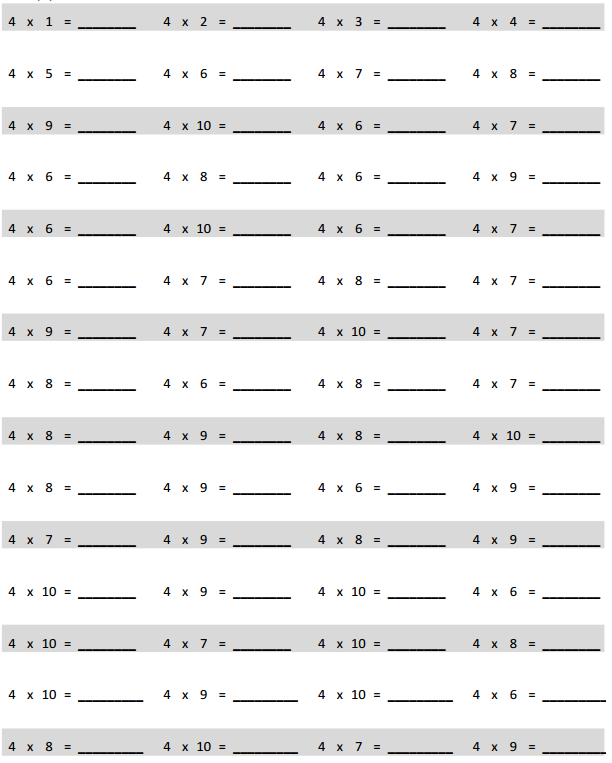
Answer:
4 x 1 = 4, 4 x 2 = 8, 4 x 3 = 12, 4 x 4 = 16, 4 x 5 = 20, 4 x 6 = 24, 4 x 7 = 28, 4 x 8 = 32, 4 x 9 = 36, 4 x 10 = 40, 4 x 6 = 24, 4 x 7 = 28, 4 x 6 = 24, 4 x 8 = 32, 4 x 6 = 24, 4 x 9 = 36, 4 x 6 = 24, 4 x 10 = 40, 4 x 6 = 24, 4 x 7 = 28, 4 x 6 = 24, 4 x 7 = 28, 4 x 8 = 32, 4 x 7 = 28, 4 x 9 = 36, 4 x 7 = 28, 4 x 10 = 40, 4 x 7 = 28, 4 x 8 = 32, 4 x 6 = 24, 4 x 8 = 32, 4 x 7 = 28, 4 x 8 = 32, 4 x 9 = 36, 4 x 8 = 32, 4 x 10 = 40, 4 x 8 = 32, 4 x 9 = 36, 4 x 6 = 24, 4 x 9 = 36, 4 x 7 = 28, 4 x 9 = 36, 4 x 10 = 40, 4 x 6 = 24, 4 x 10 = 40, 4 x 7 = 28, 4 x 10 = 40, 4 x 8 = 32, 4 x 10 = 40, 4 x 9 = 36, 4 x 10 = 40, 4 x 6 = 24, 4 x 8 = 32, 4 x 10 = 40, 4 x 7 = 28, 4 x 9 = 36.
Explanation:
In the above-given question,
given that,
multiply by 4.
4 x 1 = 4, 4 x 2 = 8, 4 x 3 = 12, 4 x 4 = 16, 4 x 5 = 20, 4 x 6 = 24, 4 x 7 = 28, 4 x 8 = 32, 4 x 9 = 36, 4 x 10 = 40, 4 x 6 = 24, 4 x 7 = 28, 4 x 6 = 24, 4 x 8 = 32, 4 x 6 = 24, 4 x 9 = 36, 4 x 6 = 24, 4 x 10 = 40, 4 x 6 = 24, 4 x 7 = 28, 4 x 6 = 24, 4 x 7 = 28, 4 x 8 = 32, 4 x 7 = 28, 4 x 9 = 36, 4 x 7 = 28, 4 x 10 = 40, 4 x 7 = 28, 4 x 8 = 32, 4 x 6 = 24, 4 x 8 = 32, 4 x 7 = 28, 4 x 8 = 32, 4 x 9 = 36, 4 x 8 = 32, 4 x 10 = 40, 4 x 8 = 32, 4 x 9 = 36, 4 x 6 = 24, 4 x 9 = 36, 4 x 7 = 28, 4 x 9 = 36, 4 x 10 = 40, 4 x 6 = 24, 4 x 10 = 40, 4 x 7 = 28, 4 x 10 = 40, 4 x 8 = 32, 4 x 10 = 40, 4 x 9 = 36, 4 x 10 = 40, 4 x 6 = 24, 4 x 8 = 32, 4 x 10 = 40, 4 x 7 = 28, 4 x 9 = 36.
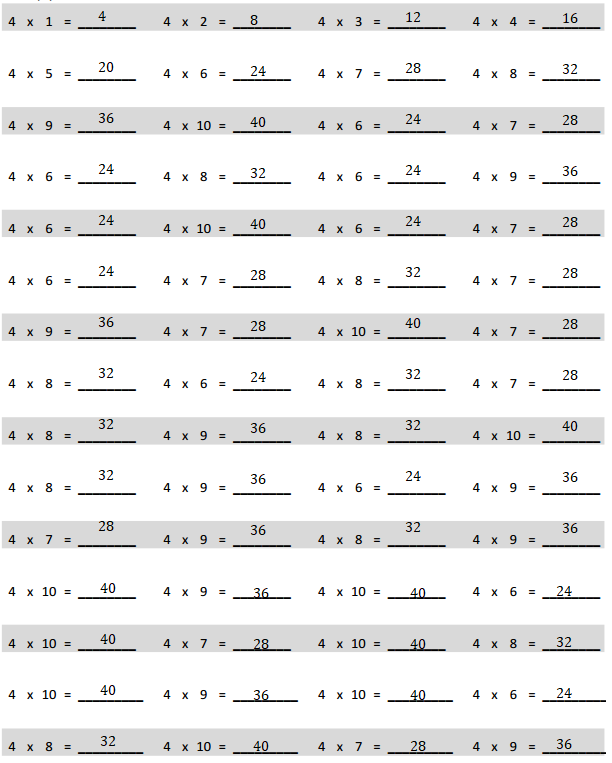
Eureka Math Grade 3 Module 4 Lesson 2 Problem Set Answer Key
Question 1.
Use all of Paper Strip 1, which you cut into 12 square inches, to complete the chart below.
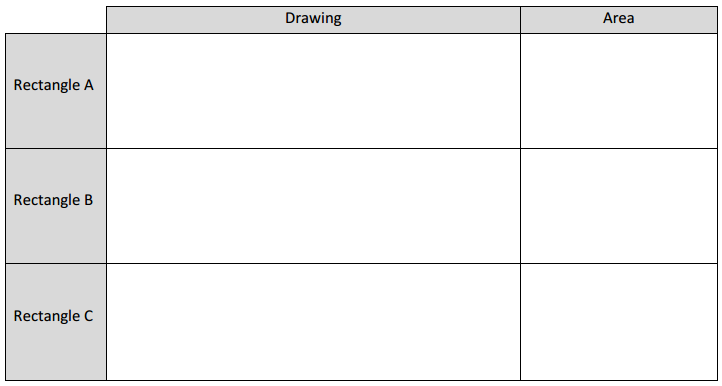
Answer:
The area of Rectangle A = 12.
the area of Rectangle B = 14.
The area of Rectangle C = 16.
Explanation:
In the above-given question,
given that,
the length of the rectangle A = 6.
the breadth of the rectangle A = 2.
Area of the rectangle = l x b.
where l = length, b = bredth.
6 x 2 = 12.
the length of the rectangle B = 7.
the breadth of the rectangle B = 2.
Area = 7 x 2 = 14.
the length of the rectangle C = 8.
the breadth of the rectangle C = 2.
Area = 8 x 2 = 16.
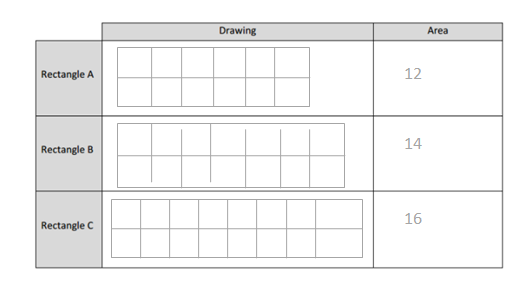
Question 2.
Use all of Paper Strip 2, which you cut into 12 square centimeters, to complete the chart below.
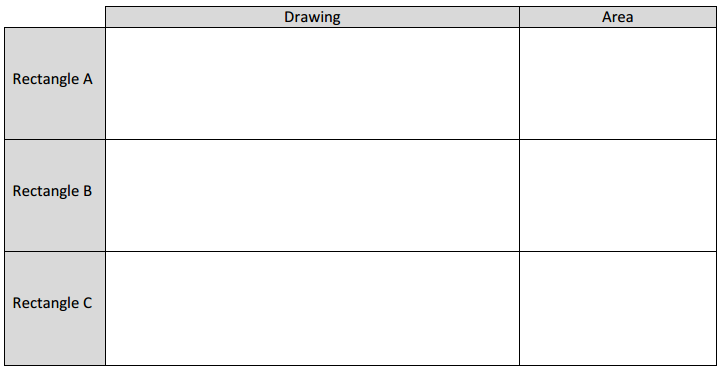
Answer:
The area of the rectangle A = 12 square centimeters.
the area of Rectangle B = 10.
The area of Rectangle C = 16.
Explanation:
In the above-given question,
given that,
the length of the rectangle A = 6.
the breadth of the rectangle A = 2.
Area of the rectangle = l x b.
where l = length, b = bredth.
6 x 2 = 12.
the length of the rectangle B = 5.
the breadth of the rectangle B = 2.
Area = 5 x 2 = 10.
the length of the rectangle C = 8.
the breadth of the rectangle C = 2.
Area = 8 x 2 = 16.
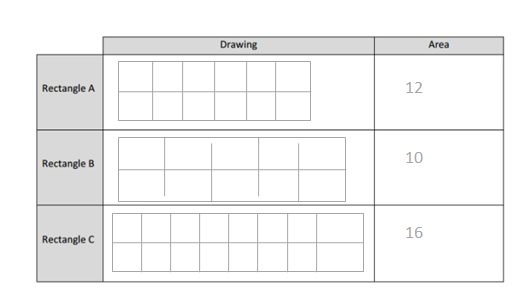
Question 3.
Compare the areas of the rectangles you made with Paper Strip 1 and Paper Strip 2. What changed? Why did it change?
Answer:
The area of Rectangle B is changed.
Explanation:
In the above-given question,
given that,
the area of rectangle B in paper Strip 1 = 14.
7 x 2 = 14.
the area of the rectangle B in paper Strip 2 = 10.
5 x 2 = 10.
so the area of Rectangle B is changed.
Question 4.
Maggie uses square units to create these two rectangles. Do the two rectangles have the same area? How do you know?
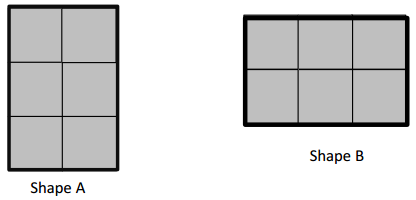
Answer:
Yes, the two rectangles have the same area.
Explanation:
In the above-given question,
given that,
Maggie uses square units to create these two rectangles.
the area of the rectangle A = 6.
2 x 3 = 6.
where length = 2, and breadth = 3.
the area of the rectangle B = 6.
3 x 2 = 6.
where l = 3, and b = 2.
so the area of the two rectangles is same.
Question 5.
Count to find the area of the rectangle below. Then, draw a different rectangle that has the same area.

Answer:
The area of the rectangle = 8.
Explanation:
In the above-given figure.
given that,
only the length is given.
8.

Eureka Math Grade 3 Module 4 Lesson 2 Exit Ticket Answer Key
Question 1.
Each ![]() is a square unit. Find the area of the rectangle below. Then, draw a different rectangle with the same number of square units.
is a square unit. Find the area of the rectangle below. Then, draw a different rectangle with the same number of square units.

Answer:
The area of the rectangle = 16.
Explanation:
In the above-given figure.
given that,
l = 8, and b = 2.
8 x 2 = 16.
so the area = 16.
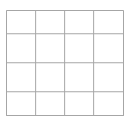
Question 2.
Each creates a rectangle with an area of 6 square inches. Luke makes a rectangle with an area of 6 square centimeters. Do the two rectangles have the same area? Why or why not?
Answer:
No, the two rectangles do not have the same area.
Explanation:
In the above-given question,
given that,
Each creates a rectangle with an area of 6 square inches.
Luke makes a rectangle with an area of 6 square centimeters.
so both of them are not same.
Eureka Math Grade 3 Module 4 Lesson 2 Homework Answer Key
Question 1.
Each  is a square unit. Count to find the area of each rectangle. Then, circle all the rectangles with an area of 12 square units.
is a square unit. Count to find the area of each rectangle. Then, circle all the rectangles with an area of 12 square units.
a.

Area = ____12___ square units
Answer:
The area of the rectangle = 12.
Explanation:
In the above-given figure.
given that,
l = 6, and b = 2.
6 x 2 = 12.
so the area = 12.
b.
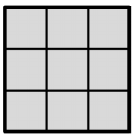
Area = ___9____ square units
Answer:
The area of the rectangle = 9.
Explanation:
In the above-given figure.
given that,
l = 3, and b = 3.
3 x 3 = 9.
so the area = 9.
c.

Area = ____12___ square units
Answer:
The area of the rectangle = 12.
Explanation:
In the above-given figure.
given that,
l = 6, and b = 2.
6 x 2 = 12.
so the area = 12.
d.
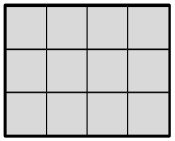
Area = ___12____ square units
Answer:
The area of the rectangle = 12.
Explanation:
In the above-given figure.
given that,
l = 4, and b = 3.
4 x 3 = 12.
so the area = 12.
e.

Area = ____5___ square units
Answer:
The area of the rectangle = 5.
Explanation:
In the above-given figure.
given that,
l = 5, and b = 1.
5 x 1 = 5.
so the area = 5.
f.

Area = ___8____ square units
Answer:
The area of the rectangle = 8.
Explanation:
In the above-given figure.
given that,
l = 2, and b = 4.
2 x 4 = 8.
so the area = 8.
Question 2.
Colin uses square units to create these rectangles. Do they have the same area? Explain.

Answer:
No, they do not have the same area.
Explanation:
In the above-given question,
given that,
the area of the shape A = 8.
4 x 2 = 8.
the area of the shape B = 6.
6 x 1 = 6.
so they do not have the same area.
Question 3.
Each ![]() is a square unit. Count to find the area of the rectangle below. Then, draw a different rectangle that has the same area.
is a square unit. Count to find the area of the rectangle below. Then, draw a different rectangle that has the same area.
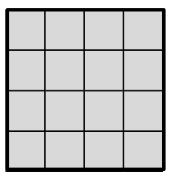
Answer:
The area of the rectangle = 16.
Explanation:
In the above-given figure.
given that,
l = 4, and b = 4.
4 x 4= 16.
so the area = 16.
